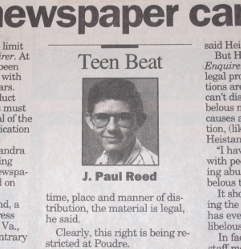Getting Back On Message
In another life, I would’ve been a journalist.
 It’s unclear which is more tragic here: the column’s title… or my hairstyle. |
During my junior and senior high school years, I wrote a column, published weekly in the local newspaper, on issues teenagers face in a standard, mid-sized western town.
In retrospect, the writing wasn’t great: my point often got buried in loquacious verbiage. But one of my mentors said years later “it was an important perspective that was not being covered… and it needed to be.”
The thing that always surprised me the most was how… emotional people could get about a particular article: reactions ranged from letters to the editor1 to veiled threats on during the school announcements. One article even resulted in the student body president beating me up.
I don’t remember how exactly2, but I found James Altucher’s blog3.
While clicking around, I came across his 33 Unusual Tips for Being a Better Writer. I forwarded it to a couple of friends who can actually claim writing as their career5.
It took a couple of weeks of pondering-on-the-back-burner to figure out why this particular post struck such a chord: Altucher had reminded me, in a very visceral way, of a couple things I’d forgotten… things that you need to remember if you want to write.
I can’t even tell you how many conversations I’ve had with friends that start with “I should really blog about…” and end with them saying “Oh, man; you can’t write that!”
In some sense, they’re probably right, but that sentiment never sat well with me.
I understand the genesis of the concern: in the last decade, we’ve seen unprecedented media consolidation, narrowing the field of idea expression. Combine this with the recent development of the idea that controlling the context of a conversation is almost more important than controlling its substance6,7, and you have an environment that’s ripe to breed the idea that certain topics and questions are just “off limits”: you don’t remark upon the emperor’s tailor and you never ask God what he needs with a starship.
Online, areas that were considered a community’s public commons are turned into feeds of similarly verbiaged and vetted content about the same projects.
Getting “off message” by introducing doubting questions is not acceptable.
The reason Altucher’s post on writing struck such a chord with me is because it pointed out the trap I had fallen into:
For each single person you worry about, deduct 1% in quality from your writing. Everyone has deductions. I have to deduct about 10% right off the top. Maybe there’s 10 people I’m worried about. Some of them are evil people. Some of them are people I just don’t want to offend.
It had gotten so bad at one point that I actually asked managerial permission to post something on my own blog. That’s how much intellectual honesty I was prepared to throw away.
The irony of being in that hole is when you feel like you have to ask permission to be honest, all in the name of joining The Message of the particular RSS cycle, you’ve already lost: that you even had to ask proves that you’re not really a part of that particular community8, and immaterial of a grant of approval, there is no way to get back the integrity you just forfeited.
Realizing that is one of the best things a writer can do… and if Altucher is right, has an added bonus of instantly-better-writing9.
Besides, even the most benevolent of dictators and gods need to be asked about shoes and starships from time to time.
_______________
1 Both complimentary and critical
2 Probably Twitter?
3 You could spend hours reading all of his cross-linked posts4
4 I know, because I (accidentally) have
5 They both liked it, except the tea drinker disputed James’ coffee claims…
6 Frank Luntz has done some fascinating work in this area
7 “Death panels” anyone?
8 Or what it’s turning into
9 Or he’ll refund all your money!

E_NO_4
and yes, fuck that asking permission shit.
The fourth footnote is a footnote to the third footnote.
The matter of asking permission strikes me as one that’s becoming bigger now that companies are aware of the Web. There’s a personal story here about your own experiences, but it takes place against a backdrop of employment agreements that actually mention social networking sites by name and restrict what can be said off company time. I don’t know what was in your terms of employment, but today some people don’t have a choice, aside from attempting to blog anonymously. I wouldn’t want to risk much on service providers standing up for anonymity.
It’s good to see you writing again.
@Ron:
Like most software licensing agreements, it’s often difficult to wade through employment agreements these days. I usually spend my sweet time with them and—to date—I haven’t seen any social networking sites mentioned by name.
The fact that such clauses are appearing in employment agreements is interesting to me because I think with the generation of workers entering the workforce, you don’t really need such clauses. If you piss off the wrong person at your job and they have enough power, one of two things will happen: they’ll fire you immediately, or they’ll put you on a performance plan that has no basis in reality, play out the charade for three weeks, and then fire you.
It’s not complicated and has been done plenty of times.
So those clauses aren’t even really necessary; the say much more about the frame of mind of management than anything else.
Having said that, one of the things I’m starting to realize from reading many of Altucher’s posts is that the plot and the characters of the story matter, but the individuals really don’t. The substance is in the framing of the story.
Besides, the people who really know you know exactly who you’re talking about anyway…
And thanks; it’s good to be writing again.